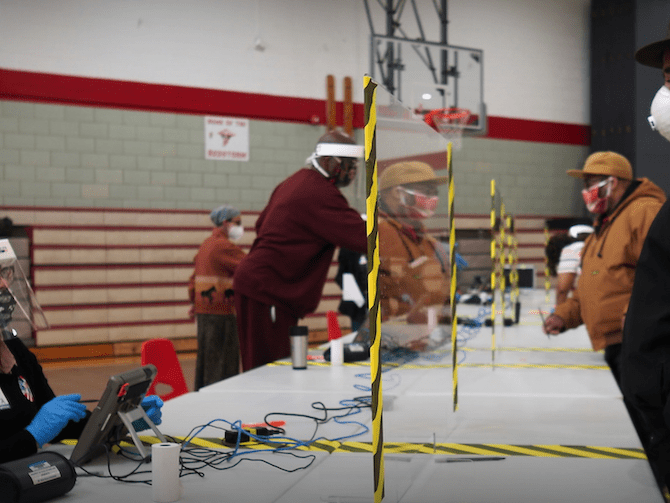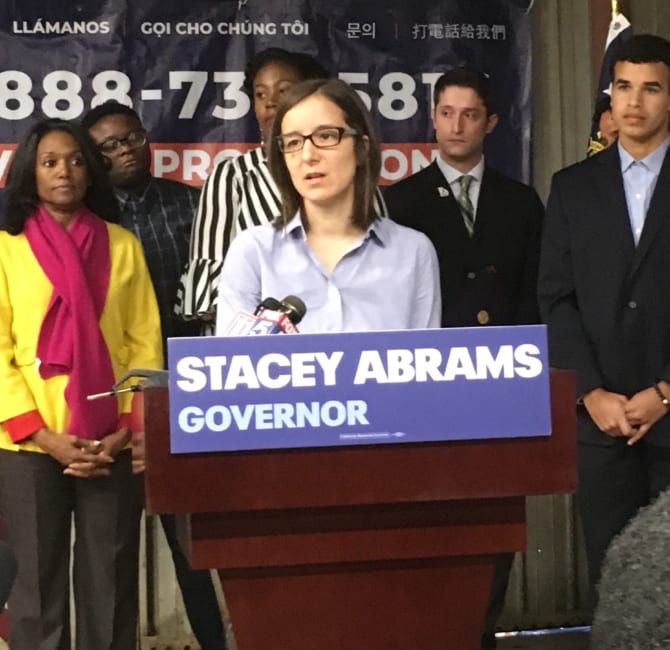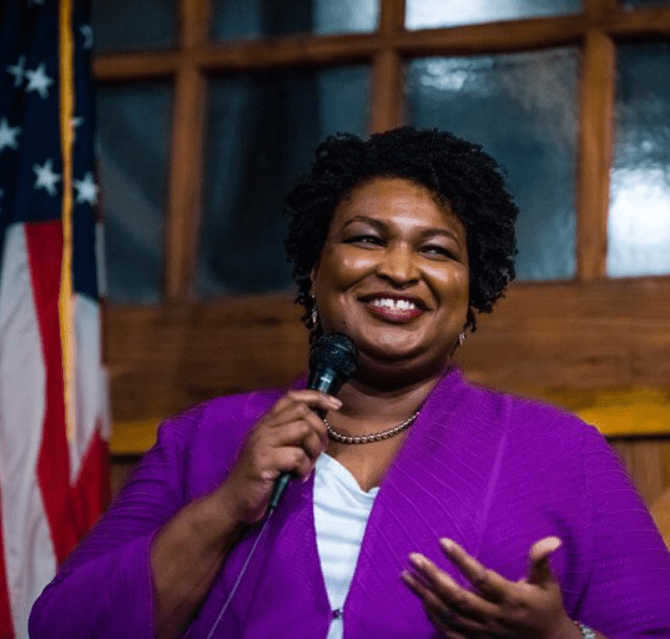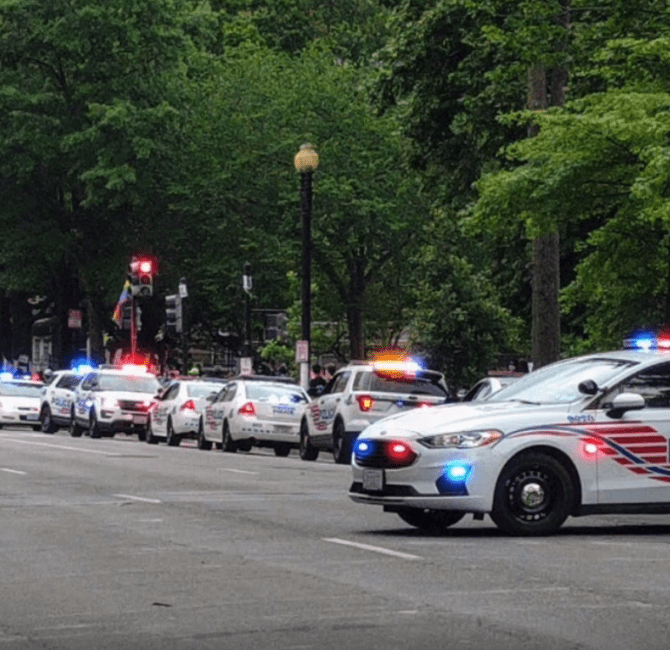Unprecedented Personal Statements by DNC Leaders as Roe Decision Breaks
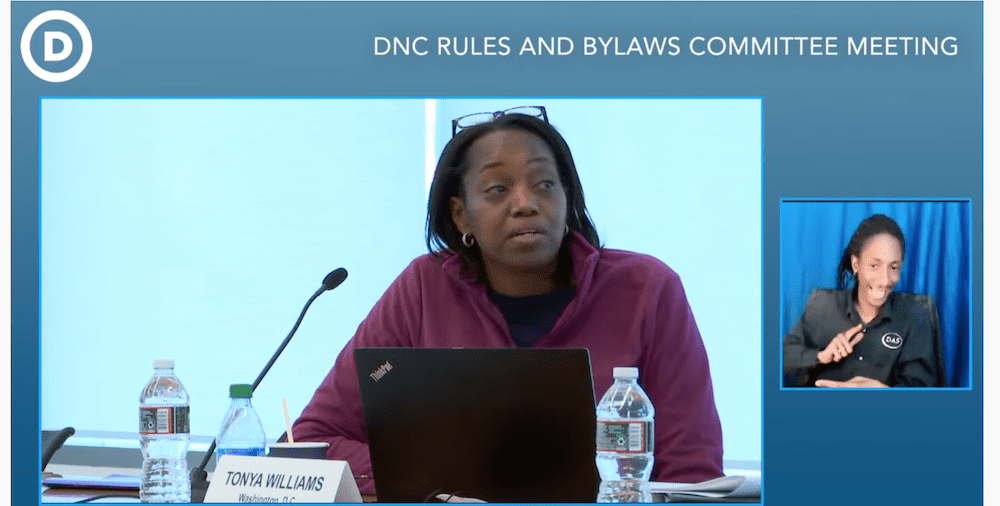
(Tonya Williams at DNC Rules Committee Meeting on June 24. Image: DNC Youtube channel)
After the U.S. Supreme Court’s decision reversing a woman’s right to an abortion broke on Friday morning, many of the women and men attending the Democratic Party’s nationwide Rules and Bylaws Committee suspended their business and spoke out as forcefully and personally as they ever have in public.
Here are some excerpts:
Ken Martin, Minnesota Democratic Farmer Labor Party chair:
“This is really much wider and expansive than just reproductive rights… I want to read this from Justice Thomas’s concurrence real quick here, because Thomas’s concurrence makes it very clear where this court is heading. He said, ‘For that reason, in future cases, we should reconsider all of this Court’s substantive due process precedents, including Griswold, Lawrence, and Obergefell [same-sex marriage].’ So we think, again, that this isn’t limited to just reproductive rights. It’s much more expansive…
“Here we are standing on the precipice of seeing things that people have literally fought and died for in this country taken away. People think that the right to vote is guaranteed; the right to marry the person you love is guaranteed; the right to make decisions over your body are guaranteed. None of it is guaranteed. And every single generation, every single person in this country has to be vigilant and stand up and fight these fights anew. I think again, as you’re reading through things as I was, this is a very expansive opinion. And we are in store for many fights to come.”
Donna Brazile, Washington, D.C.
“I grew up in a household that the word freedom wasn’t a word that we saw in a dictionary. It was how we perform our daily lives because I grew up with grandparents and parents who had no freedom. So being one of the first in my family’s history to have that freedom, it meant that I didn’t have to suffer the same indignities and the same immoralities as my grandmother, and her mother, when people could rape you and you had to bear that child. You had no right.
“And unless you could get a back-alley abortion, or somebody will allow you to have that, you carry that child. You look at my family. We come in every color, every color, because we carry children that we had to carry. This is a moment of moral clarity for all of us. It’s about our freedom. Freedom! I’m Catholic, and I’m pro-choice. I’ve always been proud to say that. I’ve dared anybody that deny me communion, because I believe that freedom was a central to who I am as a human being; my humaneness…
“Can you imagine what it’s like to be poor in America? To have nothing. To have nothing. To wait for that check and know that you owe people, and you keep on paying your bills, and now you got to deal with this and you got no other way out, no way? I’m not gonna leave the people behind in Mississippi. I’m not gonna leave poor women, I’m not gonna leave middle-class women—I’m not gonna leave no woman behind in his struggle. I’m gonna speak up and speak up and speak up and speak up. And if I offend somebody, that’s okay. But if you believe in freedom, you stop acting like this is some damn word in the dictionary. This is about our lives. My mama bore nine, my grandmother 12, I haven’t born one, but, damn it, that was my choice. But there are women today, y’all, they won’t have a choice. They won’t have a right to take this constitutional protection.”
Tonya Williams, Washington, D.C.
“While we’re thinking about the very specific consequences of this decision, I think it’s really important that we think about and talk about the fundamentals of power. Six people just told every woman in this country what she can or can’t do with her body. Unelected people…have said what the Constitution means to and for all of us. There’s a fight here that is so much bigger than this heartbreaking decision.
“When we talk about institutions, and what we believe in, and what we need to strengthen, the Supreme Court is, as I have said, the most dangerous branch. And we put a lot of focus and attention on the legislative and executive [branches]. But this is terrifying. It’s terrifying on so many levels. And it’s a place that people don’t understand. It’s a place that we don’t put enough attention and focus on. And we are big party and a big tent, and we care about lots of things, but we have to think about how to make this simple for people, so they understand the gravity of the choice, the choices that they [the Supreme Court majority] are making.”
Leah Daughtry, New York
“My fourth great grandmother was born in 1789 in what would become Savannah, Georgia. She was forced to marry my fourth great grandfather, who lived on the plantation of Charles Daughtry in Georgia. They had children when the slave master said they could have children. Their children had children when the slave master said they could have children. And they married who the slave master said they could marry. I’m the first generation in my family born with the right to vote.
“The most dangerous thing, I think, about this decision is Justice Alito’s reliance on the concept of originalism. In his decision, he says because abortion is not mentioned in the original Constitution, there therefore can be no law about abortion. There is no right to abortion because it was not originally mentioned. Well, in the original Constitution, Black men were three-fifths of a man. Are we going back to that? In the original Constitution, women were not mentioned – black, white, purple. We’re going back to that? How much of the original Constitution are we going back to? Where else are we going to make decisions based on originalism?
“I’m not going back. Lincoln freed the slaves in 1863. That’s 100 years before I was born. I’m not going back. I’m not going back to a time when someone else could make decisions about who I could marry, where I could live, what I could eat, what my family would it look like. That’s what this decision is leading us to. And we have to be conscious. This is not about abortion, y’all. I’m pro-choice, but this is not about abortion. This is about our freedoms and our ability to make our own decision. This is about power. And who gets to decide?
So, when you think about it that way, the [court’s] decision about gun rights [allowing people to carry concealed weapons in public] is not different from this decision. There’s no contradiction. Because it’s all about originalism. It all goes back to the same root. We have amended and changed our Constitution to reflect the realities and the principles of our nation. We have to decide if we are going to be the country of 2022, the country of 1965, the country when we amended the Constitution and allowed women the right to vote, when we allowed black people the right to vote. Are we an ever-evolving and changing experiment of an American society, or are we going back to 1776?”



